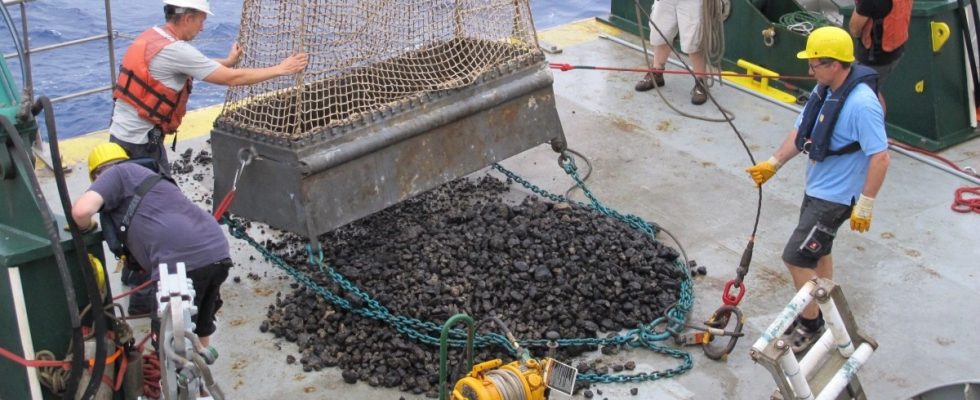On Tuesday afternoon, the Storting, the Norwegian parliament in Oslo, voted to open large areas in the North Atlantic to deep-sea mining. The area, which covers 281,000 square kilometers, lies between East Greenland and Svalbard. Norwegian geoscientists claim to have determined that around 45 million tons of zinc and 38 million tons of copper are stored there – that would be twice the amount mined worldwide annually. In addition, the ocean crust here is said to contain large amounts of gold, silver, manganese, iron, titanium, cobalt, nickel and zirconium, but also rare earths such as neodymium, yttrium and dysprosium.
All of these valuable substances also occur on land, but the majority are only mined in a few countries, including the Congo and, above all, China. Which is why the Norwegian government argues that deep sea mining must be promoted in order to become independent from China. The rare earths are urgently needed for ecological conversion, including in the construction of solar panels, magnets in wind turbines and motors in electric cars.
The resources should be extracted in an environmentally friendly manner
Norwegian Oil and Energy Minister Terje Aasland emphasized last June, the planned deep sea mining will “take environmental aspects into account throughout the entire value chain. Mining will only be permitted if the industry can demonstrate sustainability and responsible practices.” Aasland wrote that he firmly believes “that it will be possible to extract all the resources in a sustainable and responsible way.”
Tuesday’s decision does not mean that dismantling will begin immediately. The various companies interested in such drilling must now apply to Parliament for licenses. The respective environmental compatibility should also be proven.
The Environmental Justice Foundation (EJF) wrote on Tuesday in Reaction to the vote in the Storting, Norway is “setting fire to its reputation as an environmentally friendly and sustainable nation with this decision to engage in deep-sea mining.” Martin Webeler, head of the campaign against deep-sea mining at the EJF, told the SZ: “The opening is hypocritical in the sense that Norway repeatedly presents itself as a pioneer in environmental protection – including in this case, in which it justifies and emphasizes deep-sea mining with the energy transition “They want to establish ‘the highest standards’. At the same time, they ignore the recommendations of the scientific community, which is essentially unanimous in favor of stopping deep-sea mining.”
In November last year there were 121 EU parliamentarians an urgent appeal addressed to the Norwegian parliamentarians to vote against deep-sea mining, after all, harvesting the seabed would cause irreversible damage to flora and fauna.
Scientists find around 5,000 previously unknown animal species in one area
Previously, 804 international oceanologists had competed for a requested a global moratorium on deep sea mining, as long as it is not clear what effects it will have, especially since the deep sea is still hardly explored. In addition, according to marine scientists, there is a risk that masses of carbon stored in the seabed could escape into the atmosphere through mining.
Today, probably not even ten percent of the deep-sea species are known. When scientists examined the so-called Clarion-Clipperton Zone (CCZ) last year, they found 5,578 animal species, 92 percent of which had previously been completely unknown. In their paper, the scientists emphasized, that their study only amounts to a sample, so there are probably many more species. The CCZ is a deep-sea region in the Central Pacific where various countries also want to mine manganese nodules.
Norwegian environmental associations and experts also criticized Parliament’s decision. The Norwegian Institute of Marine Research (IMR) wrote that the government had only examined a tiny area in advance and simply extrapolated the mineral treasure discoveries there to the entire area.
The Storting’s decision only affects Norwegian waters, but raises fears that other countries could now also start large-scale seabed management in a kind of race. The International Seabed Authority wants to formulate global rules for deep-sea mining at the end of this year. Around 30 countries want to achieve a general ban on this management of the oceans, but many others would rather start deep sea mining in international waters today rather than tomorrow.

